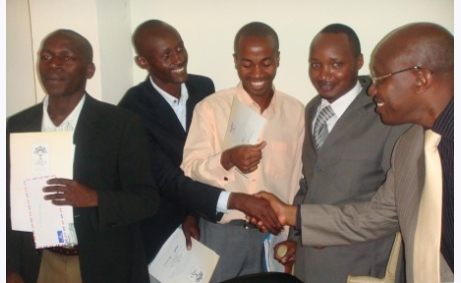
Students from Rwanda win global entrepreneurship prize set up by Gates Scholar.
Two students from the Kigali Institute of Science and Technology in Rwanda have won a new global entrepreneurship prize set up by a Gates scholar.
Julia Fan Li and colleagues set up the African Innovation Prize following a six-week intensive research trip to Rwanda in 2009 which resulted in her and her colleagues writing a report on how to improve the financial management of Rwanda’s leading King Faisal Hospital.
The aim of the AIP is to inspire student entrepreneurship and provide seed funding for new potential businesses started by students.
The prize, which is sponsored by KIST and the University of Cambridge, was launched in January and was judged in two phases by Professor Mshana from KIST, Ian Steed of Cambridge Humanitarian Centre and Pamela Hartigan, Director of the Skoll Forum at Oxford.
Phase One, awarded in March, was a “best business idea” competition and three prizes of 40,000 RWF were given. It aimed to get students interested in the concept of entrepreneurship and to encourage them to come up with creative ideas, on a risk-free basis.
Phase Two, awarded last week, was a “best business plan” competition and one grand prize of 472,000 RWF was awarded. This was to give the winning team seed capital to start a business. To receive the money, the team had to show proof of incorporation and registration with the Rwandan Development Board (RDB).
Over 33 students submitted entries for Phase One and 18 full business plans were received in Phase Two.
The winning project, submitted by Bertin Harerimana and Baptiste Dushimiyimana, involved recycling and treating human waste for use as fertiliser to reduce dependency on chemical fertilisers and prevent diseases caused by untreated human waste.
Julia Fan Li, who is studying for a PhD in Engineering and Global Health, says: “I started the African Innovation Prize because while in Rwanda, I realised the Rwandan University students were learning about entrepreneurship in theory and in the classroom – but had limited opportunities to start a business without initial funding.
“I was familiar with the idea of University business plan competitions from my time with Cambridge University Entrepreneurs and thought it would be a great opportunity for KIST students to win seed funding for their ideas. I also strongly believe entrepreneurship is one way to build sustainable development in developing countries – so it should be supported in any way possible, even at the student level.”
More information on www.aiprize.wordpress.com
Photo caption: AIP 2010 Student Award Recipients and KIST supporters












